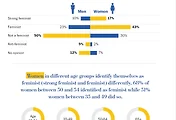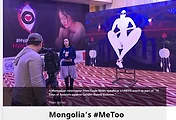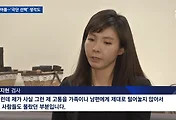뉴욕타임즈 내용 요약:
2022년 문재인 민주당 대통령에 이어 강력한 대선 후보로 거론되고 있는 안희정 충남도지사가 여비서를 강간했다는 비난 이후, 공직에서 사퇴하고 정치에서 물러난다고 발표했다.
떠오르는 정치 스타이자 유력 대통령 후보인 안희정, 작년 6월 이후 자기 여비서 김지은씨를 4차례 강간했다. 2월 25일 안희정은 김지은을 만나 한국에서 벌어지고 있는 미투 me too 운동에 대해 말하며 김지은에게 사과했으나, 그 날도 안희정은 김지은을 강간했다. “But he again did it that night,” she said, fighting back tears.
김지은은 안희정이 성폭행한 다른 여성들도 있고, 그들이 용기를 내어 미투운동에 동참했으면 한다고 말했다.
안희정은 미투운동이 벌어진 이후 최초의 정치인 가해자이다.
안희정의 추락에 한국인들은 엄청난 충격에 빠졌다. 그 이유는 안희정이 1980년대 독재정권과 맞서 싸운 학생운동 지도자 전력을 가지고 있기 때문이다. 독재정권에 협력한 보수파들과 비교해서 학생운동가들은 스스로에게 훨씬 더 높은 도덕적 수준을 요구해왔다.
세계 경제포럼 발표에 따르면 남녀 평등지수 조사에서, 144 국가들 중 한국은 118위를 차지했다. The World Economic Forum ranks the country 118th of 144 in terms of gender equality.
신희주 영화감독겸 미투 운동가의 말도 인용 보도했다. 문재인 대통령이 미투운동에 동참하고 성범죄자들을 법적 처벌할 것을 지시했지만, 청와대 안에도 (여성 비하 발언으로 문제가 된 탁현민 비서관을 지칭하는 듯) 문재인 측근들 중에 물의를 일으킨 사람이 있는데, 문재인 대통령은 그를 해고시킬 만큼 중대한 사안은 아니라는 입장이다.
신희주 감독은 이런 문재인 대통령의 입장을 보면서 문재인 대통령이 미투운동을 진지하게 고민하고 있는지 의문이 든다고 말했다.
SEOUL, South Korea — A rising political star and presidential hopeful stepped down as a provincial governor on Tuesday, becoming the most prominent South Korean accused of misdeeds by a growing #MeToo movement in this male-dominant society.
The politician, Ahn Hee-jung, governor of South Chungcheong Province, announced his resignation and retirement from public life in a Facebook post early Tuesday, hours after one of his secretaries, Kim Ji-eun, claimed in public that Mr. Ahn had raped her four times since last June.
Mr. Ahn called Ms. Kim into his office on the night of Feb. 25, looking uneasy, she said in an interview broadcast on the local cable channel JTBCon Monday. He apologetically said that while following the development of the #MeToo movement rocking South Korea, he realized that he must have hurt her, according to Ms. Kim.
“But he again did it that night,” she said, fighting back tears.
Ms. Kim said she knew there were other victims, and she hoped that her interview would encourage them to speak out, too.
Mr. Ahn’s office initially denied the rape accusations, saying that Mr. Ahn had consensual sex with Ms. Kim. But as Ms. Kim’s allegations spread on social media and the local news media devoted much attention to them, Mr. Ahn retracted his office’s statement and apologized.
“It’s all my fault,” Mr. Ahn said in the Facebook post. “I want to tell Ms. Kim Ji-eun that I am really sorry. I am asking for forgiveness for my foolish behavior.”
The #MeToo movement had been slow to catch on in South Korea until a prosecutor, Seo Ji-hyeon, asserted on television in January that one of her former bosses had groped her at a funeral in 2010. Ms. Seo’s accusation revealed that even prosecutors, one of the most powerful elite groups in South Korea, could be subject to sexual abuse.
Ms. Seo’s decision to become a whistle-blower was considered particularly brave because prosecutors are widely believed to work in one of the most strictly hierarchical organizations in South Korea. Since then, a steady stream of women have come forward with similar accusations, mainly publicized on social media. A number of prominent men, including theater directors, prosecutors, professors and Catholic priests, have apologized for sexual misconduct and resigned from their positions.
Still, most of those men worked in the film, theater and entertainment sectors, leaving the corporate and political elites of the country largely untouched by the #MeToo movement. Mr. Ahn is the first major politician to fall.
His downfall was particularly disturbing to many South Koreans.
Mr. Ahn, 52, is one of a generation of politicians who have built a successful career based on their background as former student leaders who fought for democracy under the military dictatorship in the 1980s. They have billed themselves as holding a higher moral ground than their conservative counterparts, many of whom were connected to the former military dictatorship.
Mr. Ahn has been a star among them. He lost the Democratic Party primary to Moon Jae-in, who is now the president, in April last year. He has been widely cited as one of the leading candidates to replace Mr. Moon when his five-year term ends in 2022.
Mr. Moon’s governing Democratic Party, which faces important elections for mayors and governors in June, moved quickly to control the damage. Its leadership apologized for Mr. Ahn’s actions and began the process to expel him from the party.
Men still dominate the top echelons of society in South Korea, enforcing a strictly hierarchical code that analysts say makes women vulnerable to abuse and bias. The World Economic Forum ranks the country 118th of 144 in terms of gender equality.
Many South Koreans still work in a “feudal” command-and-compliance work culture where “those who seize power get to believe that they can do whatever they want to,” the mass-circulation newspaper JoongAng Ilbo said in an editorial last month on the causes of sexual abuse in South Korea.
At a forum in Seoul last month, Shin Hee-joo, a female movie director and campaigner against sexual violence, said there was a “rape culture” in South Korea. Other feminist activists told the same forum that although victims had gathered in groups and spoken out for years, they drew little attention and were often subjected to defamation lawsuits and ostracized at work.
After weeks of silence, Mr. Moon joined the #MeToo movement last month.
“This is a problem that has been festering so long it could have burst open any time,” he said, urging legal authorities to open criminal investigations into the growing number of sexual abuse cases. “I applaud those who had the courage to tell their stories.”
But he also said South Korea “cannot solve this through laws alone and needs to change our culture and attitude.”
Ms. Shin, however, questioned Mr. Moon’s sincerity, noting that the president retained one of his aides despite allegations of sexual misconduct. Mr. Moon’s office has said the accusations were not serious enough to fire the aide.
'정책비교 > 여성' 카테고리의 다른 글
| 권수정 서울시의원 (정의당 )후보 왜 필요한가? (0) | 2018.05.10 |
|---|---|
| 2016 Jan 27. 여론조사 미국 여권운동 현황 What Americans think about feminism today (0) | 2018.03.11 |
| 손석희 뉴스룸, 안희정 도지사 성폭행 고발한 김지은씨 인터뷰를 보며 (0) | 2018.03.06 |
| 몽골 판 "미투 운동", Open your eyes , 미투운동이 아시아 연대 운동으로 발전해야 (0) | 2018.02.27 |
| jtbc 뉴스룸: 서지현 검사 가장 가슴아픈 사연 - 성추행 범죄를 남편과 가족에게도 말하지 못했다 (0) | 2018.01.30 |
| 독일 출산율 90년 이후 처음 증가, 여성 1인당 1.47명 (0) | 2015.12.16 |
| 여성의 정치 참여를 가로막는 장벽 1위는 육아 (0) | 2015.09.05 |




